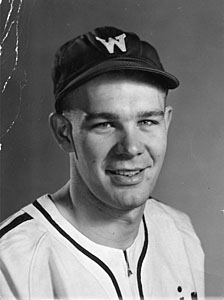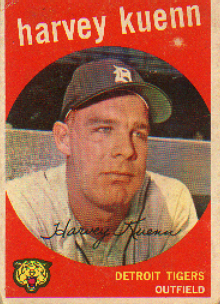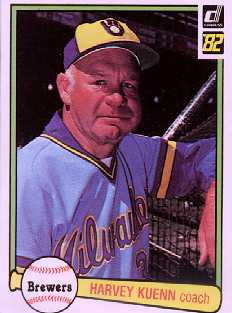





This is a website dedicated to one of the most unsung baseball heroes of all time, Harvey Kuenn. Harvey Edward Kuenn was born on December 4, 1930 in West Allis, Wisconsin. Mr. Kuenn attended the University of Wisconsin before his baseball career took off.
Despite his youth, he began his professional baseball career in 1952 at the ripe age of 21, playing for the last place Detroit Tigers and batting .325 in limited playing time. The next year, he settled in as the starting shortstop batting .308, leading the team in games played (155), doubles (33), stolen bases (6), and leading the American League in hits (209). He was only 22! He was select as the 1953 Rookie of the Year. He again led the league in hits in 1954, again batting over .300. He consistantly batted over .300 and was always among the league leaders in hits for the next five years in Detroit. In 1958, he moved permanently to the outfield, perhaps to maximize his offensive potential. His best individual season was in 1959, when he lead the league in hits (198), doubles (42) and batting average (.353) beating the likes of Ted Williams, Mickey Mantle, teammate Al Kaline, and Harmon Killebrew. He was robbed of the MVP award by Hall-of-famer Nellie Fox, despite having a better average, more hits, more home runs, more runs batted in, more stolen bases AND with 60 less at bats!
That off-season, he was involved in one of the most infamous trades in major league history. In early 1960, he was traded to the Cleveland Indians for popular slugger Rocky Colavito. This trade is the famous "curse" which many believe kept the Tribe out of the World Series until 1995. In 1960 for the Indians he again topped .300 with a .308 average. He was then dealt to San Francisco Giants. In 1961 and 1962 he started in the Giants outfield with Hall-of-Famer Willie Mays and current San Francisco Giants Manager Felipe Alou. The Giants made the World Series in 1962, which marked the only time Kuenn played in the Fall Classic. His Giants lost a tight 7 game series to Mickey Mantle and the New York Yankees. His career began to taper as he became the Giants #1 bench player, losing his starting job to Hall-of-Famer Willie McCovey in 1963, yet still playing in 120 games. 1963 when the Giants lost to the Los Angeles Dodgers in a three game playoff series (the Dodgers went on to sweep the powerful New York Yankees in 4 games), Kuenn never came close to a title again.. His last few seasons were spent with the hapless Chicago Cubs and Philadelphia Phillies before he retired after the 1966 season.
His final career statistics:
Games: 1833
Average: .303
Hits: 2092
Runs: 951
Stolen Bases: 68
Walk/Strikeout ratio: 3:2
Harvey began coaching the Milwaukee Brewers in 1971. His coaching career for the Milwaukee Brewers brought him just as much success as his playing career. In fact, the Brewers named their top hitting award after Kuenn. He began his managerial career in earnest in 1975, managing the last game of the year (in which the Brewers won). Many thought he would be forced to retire from coaching when he had the lower party of his right leg amputated because of blood clot problems during Spring Training in 1980. As a true display of the man he was, he returned to the dugout by mid-season. In 1982, he was named field manager, replacing Bob Rogers after 47 games. At the time the Brewers were 23-24 grossly underachieving. Harvey's Wallbangers (as they became known for their offensive prowess) won 63% of the rest of their games to place them in the American League Championship Series for the first time in franchise history. They went on to edge the Angels in the ALCS by taking the final 3 games after falling down 2 games to none. Game 5 included a magnificent 2-run seventh inning that were the final runs to edge the Halos 4-3.
In one of the greatest World Series in recent memory, Kuenn's Brewers dropped a close 7 game series to the St. Louis Cardinals. Despite gaining a 3-2 game lead, the Brewers bats slept through the final 18 innings only getting 4 runs on 11 hits. Harvey was replaced as the Brewers' manager prior to the 1984 season. His career .575 winning percentage is one of the highest ever by a manager.
Harvey's life ended tragically when he passed away on February 28, 1988. He was only 57. I believe that some day Harvey will be inducted into the Baseball Hall of Fame in Cooperstown, New York on the veteren's committee ballot. He appeared in the Top 10 for the regular balloting for seven straight years (1985-1991) but never garnered more than 168 votes which is barely more than half needed for induction. The way he maximized his talent, his passion and knowledge for the game, and his off the field spirit and tenacity proves that he is indeed one of the great figures in baseball history.